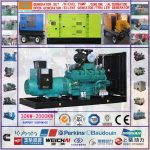Introduction
In today's modern world, where businesses and industries rely heavily on uninterrupted power supply, diesel generators play a crucial role in ensuring continuous operations during power outages. 150kw diesel generator for remote research facilities of the key characteristics that make diesel generators a preferred choice for many applications is their ability to provide rapid load acceptance. This feature allows diesel generators to quickly respond to sudden changes in load demand, making them ideal for critical situations where a reliable power supply is essential.
This article will delve into the importance of rapid load acceptance in diesel generators, the factors influencing this capability, and the technologies used to enhance it. We will also explore real-world applications where rapid load acceptance is critical and provide insights into best practices for ensuring optimal performance of diesel generators in such scenarios.
Understanding Rapid Load Acceptance in Diesel Generators
Rapid load acceptance refers to the ability of a diesel generator to quickly adjust its output in response to sudden changes in load demand. In practical terms, this means that a diesel generator should be able to ramp up its power output rapidly when a new load is connected to it, and conversely, reduce its power output swiftly when the load is removed. This capability is essential in situations where the power demand fluctuates frequently or where critical loads need to be supported without interruption.
The ability of a diesel generator to provide rapid load acceptance is influenced by several factors, including the engine design, the control system, and the ancillary equipment. A well-designed diesel engine with a robust combustion process and efficient fuel delivery system is essential for achieving rapid load acceptance. Additionally, the control system of the generator must be able to accurately monitor and respond to changes in load demand to ensure smooth and reliable operation.
Technologies for Enhancing Rapid Load Acceptance
To enhance the rapid load acceptance capability of diesel generators, various technologies and techniques are employed. One of the key technologies used for this purpose is electronic engine control systems, which allow for precise control of the engine speed and fuel delivery to respond quickly to load changes. These systems use advanced algorithms to optimize the engine performance and ensure rapid load acceptance without compromising fuel efficiency or emissions.
Another technology that plays a crucial role in enhancing rapid load acceptance is the use of turbochargers and intercoolers. Turbochargers increase the air intake pressure in the engine, allowing for more efficient combustion and faster response to load changes. Intercoolers help cool the compressed air before it enters the engine, improving its density and further enhancing the engine's performance during load transitions.
Furthermore, advancements in generator design, such as the use of high-quality alternators and voltage regulators, contribute to improved load acceptance capability. These components ensure stable voltage and frequency output even under varying load conditions, providing a reliable power supply to critical loads.
Real-World Applications and Importance of Rapid Load Acceptance
Rapid load acceptance is particularly critical in a wide range of real-world applications where uninterrupted power supply is essential. One such application is in data centers, where any disruption in power supply can lead to data loss and system downtime. Diesel generators with rapid load acceptance capability are deployed as backup power sources in data centers to ensure continuous operation in the event of a grid outage.
Another important application of diesel generators with rapid load acceptance is in healthcare facilities, such as hospitals and clinics. In these settings, reliable power supply is crucial for operating life-saving equipment and maintaining essential services. Diesel generators act as emergency backup power sources to support critical loads during power outages, with rapid load acceptance ensuring seamless transition to generator power.
Other industries that benefit from diesel generators with rapid load acceptance include telecommunications, manufacturing, and mining. In telecommunications, for example, uninterrupted power supply is necessary to maintain network connectivity and communication services. Diesel generators with rapid load acceptance are used to provide backup power during grid failures, ensuring continuous operation of telecommunication infrastructure.
Best Practices for Ensuring Optimal Performance
To ensure optimal performance of diesel generators with rapid load acceptance, it is essential to follow best practices in installation, maintenance, and operation. Proper sizing of the generator based on the expected load requirements is crucial to ensure that the generator can handle the peak load demand with ease. Regular maintenance, including servicing of the engine and ancillary equipment, is essential to keep the generator in top condition and prevent unexpected failures.
Additionally, conducting regular load tests and simulations can help identify any potential issues with the rapid load acceptance capability of the generator and allow for timely corrective actions. Monitoring the generator performance during load transitions and analyzing the response time can provide valuable insights into its overall reliability and efficiency.
Conclusion
In conclusion, diesel generators with rapid load acceptance play a vital role in ensuring reliable power supply in critical situations where uninterrupted operation is essential. The ability of a diesel generator to quickly adjust its output in response to load changes is influenced by various factors, including engine design, control systems, and ancillary equipment. Technologies such as electronic engine control systems, turbochargers, and high-quality alternators are used to enhance the rapid load acceptance capability of diesel generators.
Real-world applications where rapid load acceptance is critical include data centers, healthcare facilities, and telecommunications, among others. By following best practices in installation, maintenance, and operation, organizations can ensure optimal performance of diesel generators with rapid load acceptance and minimize the risk of power disruptions in critical situations. Diesel generators continue to be a reliable and efficient power source for various industries, providing peace of mind in the face of uncertain power supply conditions.

